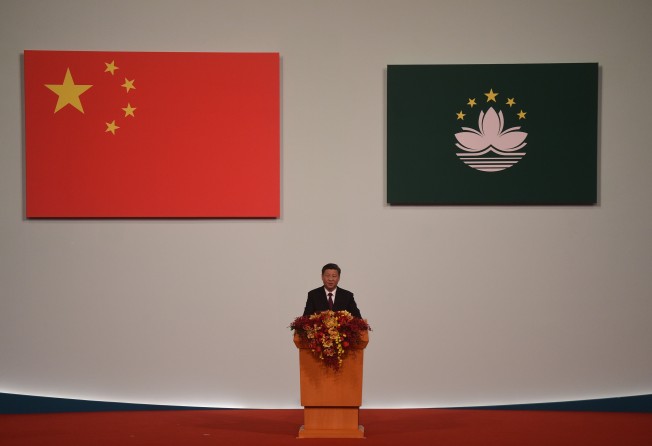Why Hong Kong should not dismiss Macau’s ambition for a yuan-denominated stock exchange
- The former Portuguese colony faces formidable challenges in creating the necessary conditions for a thriving yuan market, but a supportive Beijing may greatly ease its path to success
- Hong Kong needs to consider ways to create synergies with its neighbour

While President Xi Jinping did not make any formal announcement about creating a renminbi-denominated securities market in Macau during his visit to the former Portuguese enclave, to mark the 20th anniversary of its return to China, it cannot be ruled out.
Reports have persisted that Macau is seriously exploring the possibility of setting up an exchange akin to the Nasdaq for tech companies or a renminbi-denominated securities exchange. Most people in Hong Kong, however, have dismissed and even sneered at such ideas, arguing that Macau simply does not have what it takes to create a securities exchange, let alone a Nasdaq-style exchange.
Certainly, they have reason to believe so. In terms of territorial size, gross domestic product and population, Hong Kong overshadows its neighbour. In terms of economic structure, Macau is driven by its gambling and tourism industries whereas Hong Kong showcases a more diversified and dynamic economy.
Like the other two leading stock markets, in New York and London, Hong Kong has a common law system, the only common law jurisdiction in the region, whereas Macau has a civil law system, which may not be as compatible with the modern, robust and fast-moving financial markets.
Besides, Hong Kong has taken many decades to create a well-established ecosystem of securities trading and investment. Its residents started trading in shares as far back as the 1860s. In the 1980s, the Stock Exchange of Hong Kong, the predecessor of the current Hong Kong Exchanges and Clearing, was formed out of a merger of four exchanges, laying the foundation for its subsequent spectacular growth.
With this long history and maturity of the stock market, Hong Kong has attracted talent from overseas and produced many top-flight stock analysts, lawyers, dealers, corporate finance executives, institutional investors and regulators. There is no similar large talent pool in Macau.
For a stock market to prosper, any city must meet at least one critical condition – have sufficient free flow of money circulating in the market. Although there are no capital flow restrictions in Macau, the size of its domestic money supply is rather small.
This is crucial because, theoretically, the more money residents in a city have, the more likely they will be to invest in shares, keeping the stock market thriving.
According to figures from the cities’ monetary authorities, the total value of deposits and cash in Hong Kong is approximately 23 times that of Macau, or some US$1.8 trillion in Hong Kong versus US$81 billion in Macau. Clearly, Macau needs to make enormous efforts if it is to catch up and create a credible securities market.

In addition, if Macau truly aspires to launch a renminbi-denominated securities market, it needs a substantial amount of renminbi in the banking system. It is reported that renminbi deposits in Macau account for less than 7 per cent of the total holdings of the yuan in Hong Kong (approximately US$91 billion).
However, even with this amount of renminbi deposits in Hong Kong, trading in renminbi-denominated equity products is still not as good as had been expected. Therefore, one wonders whether a renminbi-denominated securities market in Macau could ever take off.
However, we should not just brush aside Macau’s vision to establish a securities market. If Beijing throws its full weight behind it – and this looks highly likely, as reflected in Xi’s lavish praise of Macau’s achievements and its ability to fully implement “one country, two systems” – it would have many options to do so.
For a start, it could encourage Chinese hi-tech start-ups to go to Macau to raise funds in renminbi. After all, the number of innovation and technology start-ups continues to grow every year.
Therefore, Hong Kong should not treat Macau as its little cousin. We must find a mutually beneficial way to create synergies with Macau and the Greater Bay Area for our young professionals.
Ken Chu is group chairman and CEO of Mission Hills Group and a national committee member of the Chinese People’s Political Consultative Conference